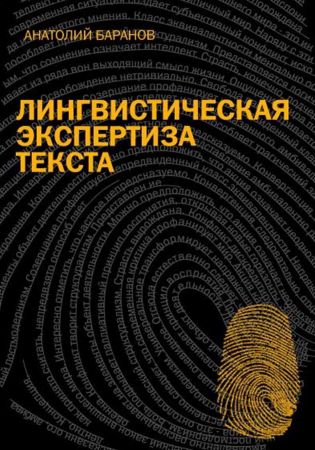Baranov Lingvisticheskaya Ekspertiza Teksta Pdf

[5] Baranov AN & Vinogradov VV, Lingvisticheskaya ekspertiza teksta: teoreticheskie osnovaniya i praktika: ucheb. Posobie [Linguistic Exper- tise of the Text:. 25 Baranov, Lingvisticheskaya ekspertiza teksta: teoriia i praktika: uchebnoe posobie [Linguistic Investigation], 463. Kara-Murza, “Lingvisticheskaia ekspertiza kak protsedura politicheskoi lingvistiki” [Linguistic investigation as a procedure of political linguistics], Politicheskaia lingvistika, no 7 ( 2009), 49.
Abstract Background. This study addresses a current problem relating to trust and the identification of gender differences in trust/mistrust manifestation. Gender identity is associated with cultural stereotypes and social roles, which facilitate the formation of trust in people. It acts as a significant integral meaning-based component of an individual’s “I”- conception, which contributes to the formation of trust in himself and the world around him.
Are you ready to explore a picturesque German city behind the wheel of a realistically modeled, freely accessible bus?  TORRENT – FREE DOWNLOAD – CRACKED Bus-Simulator 2012 – Catch the bus and let it take you to a detailed, virtual world.Are you ready to explore a picturesque German city behind the wheel of a realistically modeled, Game Overview Catch the bus and let it take you to a detailed, virtual world. Then take a look at “Bus Simulator 2012” by the well-known developer studio TML!
TORRENT – FREE DOWNLOAD – CRACKED Bus-Simulator 2012 – Catch the bus and let it take you to a detailed, virtual world.Are you ready to explore a picturesque German city behind the wheel of a realistically modeled, Game Overview Catch the bus and let it take you to a detailed, virtual world. Then take a look at “Bus Simulator 2012” by the well-known developer studio TML!
To study features of trust/mistrust towards others in young people with different gender identities. The cross-gender-typical sample consisted of 179 representatives, 83 males and 96 females, ages 17 to 23 (M = 19.34 and SD = 1.79). The techniques for collecting data included the MMPI, the Sex-Role Inventory by S. Bem, and the Trust/Mistrust towards Others questionnaire by A.

The results were processed via the Mann-Whitney U Test, the Kruskal-Wallis H criterion, and cluster analysis. Criteria of trust/mistrust among the youth with different gender identities were identified, and basic types of trust — categoric, irrational–emotional, ambivalent– contradictory, and non-differentiated — were singled out. Irrespective of biological sex, bearers of different gender identities do not exhibit the same criteria to determine trust/ mistrust. This study makes it possible to enrich our understanding of the role of social gender in the formation of interpersonal trust and differences in the foundations of trust toward others, in people with different gender identities. The empirical typology of trust in youth with different gender identities allows for using the typology in organizing psychological diagnostics, and for support and improvement of their interpersonal relations. Authors: Received: Accepted: Themes: PDF: Pages: 149-164 DOI: 10.11621/pir.2017.0210 Keywords: forensic, psychological, expert opinion, insult, cartoon, collage, politics, social status, gender Introduction Political caricatures have always been a means of political struggle.
However, different methods of criticism through cartoons carry different psychological messages for an individual. The most socially acceptable cartoons are those that mock negative social phenomena or actions (Laskova & Zueva, 2016), whereas caricatures that deliberately insult a particular person do not receive any similar social approval as they violate the individuals legal right to honor and dignity. In Russia, such acts are prohibited by the Constitution. In literature sources, we have found some evidence that even friendly caricatures can be perceived as an insult to the person because they intentionally accentuate negative aspects of the persons appearance or character flaws (Emelyanov, 2011), which is perceived by a person as painful. Various studies have made attempts to identify a list of offensive caricature techniques, but due to the delicacy of the topic, they analyzed mostly non-insulting caricatures or only slightly offensive drawings. For example, the analyzed caricatures of President Barack Obama showed him as a showman, an unlucky businessman, a drunkard, an old nag, etc.